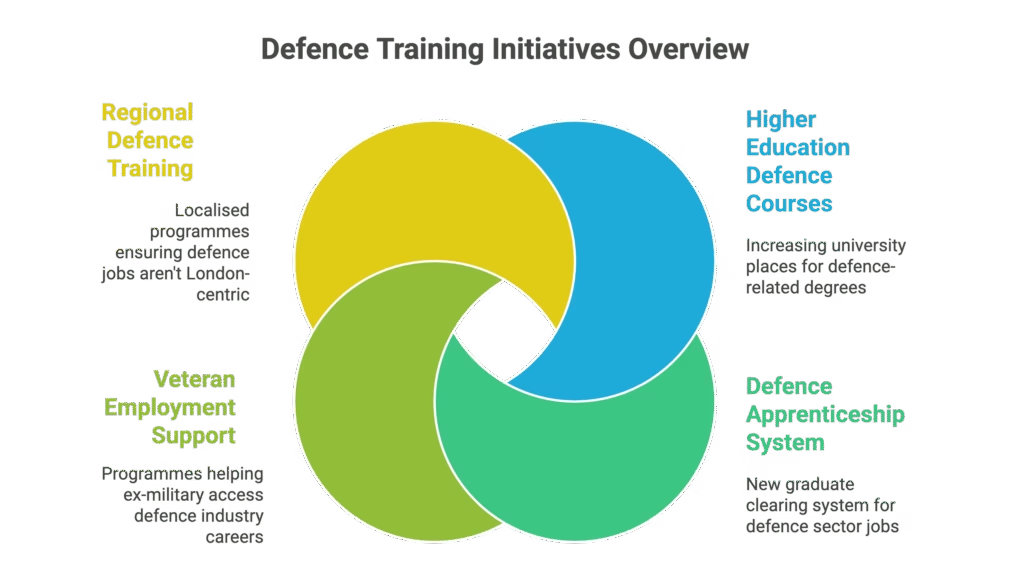The UK defence training sector is getting a massive shake-up. With defence spending set to hit £70bn+ by 2027, the government just announced a £182m defence skills investment that’ll transform how Britain prepares workers for modern warfare and defence jobs.
Here’s the deal: five new “technical excellence colleges,” thousands of students fast-tracked into defence careers, and UK defence training programmes running at what officials call “wartime pace.” It’s the biggest defence workforce strategy in decades, targeting everything from submarine engineers to cyber warfare specialists.
New UK Defence Colleges and Training Programmes
Five Technical Excellence Colleges Launch by 2026
The government’s defence industrial strategy includes five new specialist colleges opening their doors in 2026. These defence training institutions will focus on high-demand skills like submarine engineering, cyber warfare, and advanced manufacturing for the defence sector.
Applications for these UK defence colleges go live by year-end, with the Ministry of Defence targeting rapid deployment to meet urgent skills shortages.
Defence STEM Programmes Target School Students
Regional STEM initiatives will reach “thousands” of school-age students over four years, creating pathways into lucrative defence careers. These defence education programmes aren’t just coding camps – they’re designed to funnel talent directly into national security roles.
The defence skills shortage has reached critical levels, making these youth programmes essential for long-term workforce planning.
Adult Defence Training and Reskilling
Already working in the defence industry? Targeted short courses will upgrade your skills without career breaks. The defence sector evolution demands rapid upskilling, and these programmes deliver exactly that.
Veterans also get priority access to defence job transition programmes, helping military experience translate into civilian defence roles.

£182M Defence Investment Breakdown
This isn’t just throwing money at the problem. The defence training funding targets specific areas:
- Higher Education Defence Courses: More university places for defence-related degrees and apprenticeships
- Defence Apprenticeship System: New graduate clearing system specifically for defence sector jobs
- Veteran Employment Support: Dedicated programmes helping ex-military access defence industry careers
- Regional Defence Training: Localised programmes ensuring defence jobs aren’t just London-centric
Defence Secretary John Healey called it “the biggest defence skills plan in decades,” while Education Secretary Bridget Phillipson emphasised breaking down barriers to defence career opportunities.

Why UK Defence Training Needs This Urgent Overhaul
With UK defence spending jumping £13.4bn annually by 2027, the skills gap has become critical. The government positions defence as “the engine room for national renewal,” but you can’t renew what you can’t staff.
The “wartime pace” language isn’t marketing spin – it reflects genuine urgency around defence readiness and the need for skilled defence workers who can innovate under pressure.
Modern defence challenges require workers who understand both traditional engineering and cutting-edge technology. These defence training programmes bridge that gap.

Impact on UK Defence Jobs Market
This defence strategy creates career pathways that didn’t exist before. Whether you’re 16 considering your options or 35 looking to pivot into the growing defence sector, these programmes open doors.
The real question? Whether these defence training initiatives can deliver skilled workers fast enough to meet evolving threats. Early indicators suggest the government is serious about results, not just announcements.
Ready to explore defence career opportunities? Monitor application deadlines and programme launches throughout 2025 for defence training opportunities.
Frequently Asked Questions About UK Defence Training
Q1: When do the new UK defence colleges actually open?
A: Defence college applications went live by the end of 2024, with successful institutions launching in 2026. The tight timeline reflects urgent defence skills shortages across the sector.
Q2: Who qualifies for these defence training programmes?
A: Everyone from school students (through STEM initiatives) to current workers (short courses), veterans (transition programmes), and graduates (apprenticeship clearing system). The defence sector needs diverse talent fast.
Q3: What specific defence jobs are being prioritised?
A: Submarine engineers, cyber warfare specialists, advanced manufacturing roles, and other high-tech defence positions. Think cutting-edge technology rather than traditional military roles.
Q4: How much is UK defence spending increasing?
A: Defence spending rises to over £70bn annually by 2027, up £13.4bn from current levels. This massive increase demands equally massive workforce expansion.
Q5: Are these defence programmes just about preparing for war?
A: While framed as “national renewal” and job creation, the “wartime pace” terminology suggests preparation for scenarios beyond peacetime operations. The defence industry offers stable, well-paid careers regardless.
DISCLAIMER
Effective Date: 15th July 2025
The information provided on this website is for informational and educational purposes only and reflects the personal opinions of the author(s). It is not intended as financial, investment, tax, or legal advice.
We are not certified financial advisers. None of the content on this website constitutes a recommendation to buy, sell, or hold any financial product, asset, or service. You should not rely on any information provided here to make financial decisions.
We strongly recommend that you:
- Conduct your own research and due diligence
- Consult with a qualified financial adviser or professional before making any investment or financial decisions
While we strive to ensure that all information is accurate and up to date, we make no guarantees about the completeness, reliability, or suitability of any content on this site.
By using this website, you acknowledge and agree that we are not responsible for any financial loss, damage, or decisions made based on the content presented.






